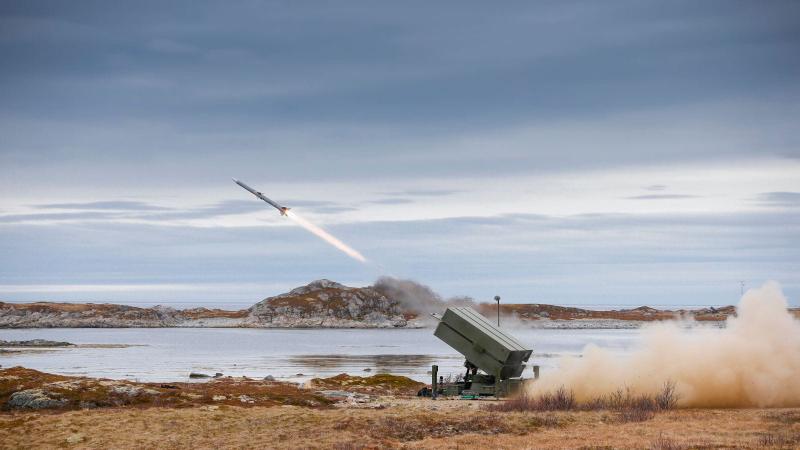The US-Taiwan Business Council called a potential US$2 billion US arms sale package to Taiwan “an important development” and commended both sides for coming to an agreement.
The package is made up of US$1.16 billion in missile systems, and US$828 million in radar systems.
The missile systems are three National Advanced Surface-to-Air Missile Systems (NASAMS), which are being exported to Taiwan for the first time and would make it only the third country in the region with access to them after Australia and Indonesia, according to US Defense officials who spoke on the condition of anonymity, and the radars are AN/TPS-77 and AN/TPS-78 systems.

Photo: Screen grab from RTX Web site
NASAMS have been deployed in Ukraine, and the Ministry of Foreign Affairs called them “proven” in a statement expressing thanks on Friday last week.
The missiles and radar “serve as a significant step forward in the modernization of Taiwan’s air-defense architecture” said the council’s president, Rupert Hammond-Chambers, adding that they represent a “significant broadening” of US President Joe Biden’s administration’s approach to Taiwan’s defense.
The council has often commented on defense matters relating to the two countries, as it hosts the annual US-Taiwan Defense Industry Conference which brings together officials and experts from both nations.
Hammond-Chambers went on to say that this program should lead to “greater consideration of all the military threats posed to Taiwan,” as the radar systems will allow for much more maritime and aerial surveillance of Taiwan to defend against “gray zone” activities by China.
The NASAMS will be integrated into a defense architecture that already includes Patriot-III missile, also American, and Taiwan’s domestically developed Tien-Kung III missile defenses, the statement read.
He called on Taiwan’s military to further strengthen its defenses and ensure adequate supplies of ammunition and missile components in preparation for a conflict.

Beijing could eventually see a full amphibious invasion of Taiwan as the only "prudent" way to bring about unification, the US Department of Defense said in a newly released annual report to Congress. The Pentagon's "Annual Report to Congress: Military and Security Developments Involving the People's Republic of China 2025," was in many ways similar to last year’s report but reorganized the analysis of the options China has to take over Taiwan. Generally, according to the report, Chinese leaders view the People's Liberation Army's (PLA) capabilities for a Taiwan campaign as improving, but they remain uncertain about its readiness to successfully seize

Taiwan is getting a day off on Christmas for the first time in 25 years. The change comes after opposition parties passed a law earlier this year to add or restore five public holidays, including Constitution Day, which falls on today, Dec. 25. The day marks the 1947 adoption of the constitution of the Republic of China, as the government in Taipei is formally known. Back then the Chinese Nationalist Party (KMT) governed China from Nanjing. When the KMT, now an opposition party in Taiwan, passed the legislation on holidays, it said that they would help “commemorate the history of national development.” That

HORROR STORIES: One victim recounted not realizing they had been stabbed and seeing people bleeding, while another recalled breaking down in tears after fleeing A man on Friday died after he tried to fight the knife-wielding suspect who went on a stabbing spree near two of Taipei’s busiest metro stations, Taipei Mayor Chiang Wan-an (蔣萬安) said. The 57-year-old man, identified by his family name, Yu (余), encountered the suspect at Exit M7 of Taipei Main Station and immediately tried to stop him, but was fatally wounded and later died, Chiang said, calling the incident “heartbreaking.” Yu’s family would receive at least NT$5 million (US$158,584) in compensation through the Taipei Rapid Transit Corp’s (TRTC) insurance coverage, he said after convening an emergency security response meeting yesterday morning. National

Taiwan has overtaken South Korea this year in per capita income for the first time in 23 years, IMF data showed. Per capita income is a nation’s GDP divided by the total population, used to compare average wealth levels across countries. Taiwan also beat Japan this year on per capita income, after surpassing it for the first time last year, US magazine Newsweek reported yesterday. Across Asia, Taiwan ranked fourth for per capita income at US$37,827 this year due to sustained economic growth, the report said. In the top three spots were Singapore, Macau and Hong Kong, it said. South